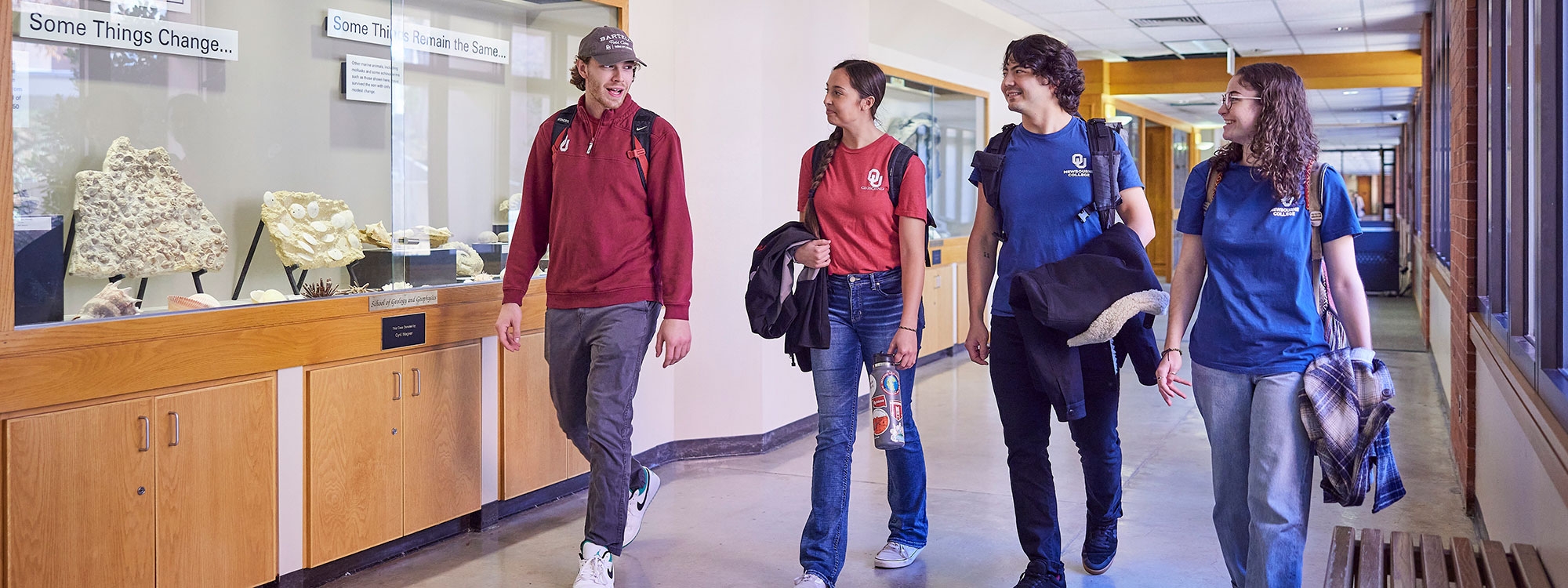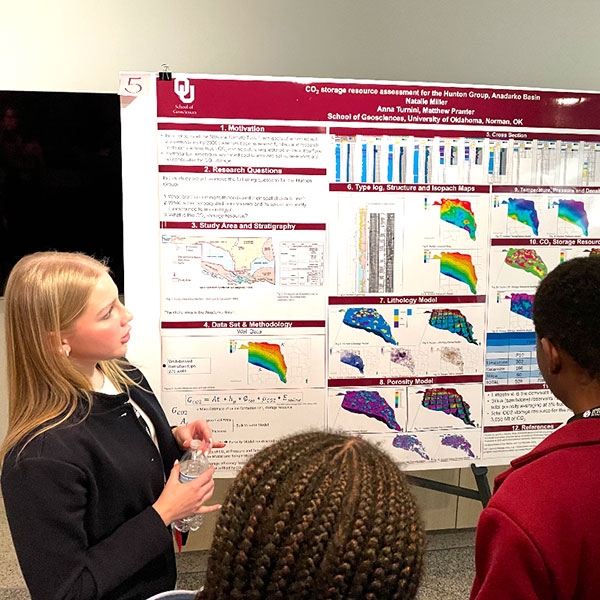
Geoscientists are diverse - they include geologists, paleontologists, geochemists and geophysicists, to name a few, and pursue careers as researchers, energy professionals and government executives.
Geoscientists investigate Earth processes, materials and geological features and their changes through Earth history. They work to provide natural resources for society, address fundamental Earth sciences questions and solve some of the world's most important challenges.
Geoscientists often work in the field, in the laboratory and with high-end computers to evaluate data and geological formations at Earth's surface and within Earth's interior. Our faculty and students represent a diverse range of geoscience fields related to Earth, energy and the environment.
Use the rocks to invesitgate the processes that shape the Earth, analyze Earth's history and the distribution of raw materials.
Explore some of the same problems by application of physical, numerical and computer technology to the student of Earth's interior and for the exploration of natural resoruces.


Thanks to our incredible network of alumni and donors, there are significant scholarship opportunities available to geosciences students.
Qualified students receive a minimum of $1,000 each year.

Undergraduate research gives our students an opportunity to gain hands-on experience early in their college career. Students partner with faculty members, in the field and in the lab, to assist with research projects ranging from African lake sediments, to analyzing international earthquake data. With the help of departmental research grants, these projects can culminate in a senior thesis and lead to a publication or presentation at a national scientific conference.

From the Guadalupe Mountains to Carlsbad Caverns, most geosciences classes involve trips that allow students to apply the tools they learn in the classroom to the field. These field trips provide the opportunity to examine rocks and structures, observe earth processes, participate in field research and form lasting friendships with your field partners.
All of these field trips culminate in field camp - the six-week course that occurs after your junior or senior year.

The First-Year Field Trip is an opportunity for students in geosciences to take a week-long field trip to visit OU's Bartell Field Camp and discover the geology around Cañon City, CO.
Students and faculty spend several days exploring the outdoors and traveling to unique geological features like weathered igneous intrusions, ancient fossil beds, massive sand dunes, mountain glaciers, and beautiful rocky canyons. Each stop gives them the opportunity to learn more about geologic history, admire the earth, and form lifelong friendships with peers.
For more information, please contact: Gail Holloway gholloway@ou.edu

An education in geosciences opens up opportunities for a variety of career paths in energy and mineral resources, environmental and academia. Our graduates are also prepared for careers with geoscience applications in law, economics, meteorology, oceanography, science writing and consulting firms.


Pete Reilly works as Lead Engineer for Liberty Energy, hired on through SLB’s OneStim out of El Reno, Oklahoma in November 2020. Pete is on hydraulic fracturing fleets throughout North America, working 2 weeks on - 2 weeks off schedule, 12 hour shifts, days or nights. He was also selected for an international project in Australia’s Northern Territory scheduled for Fall 2024. Pete is responsible for onsite chemicals & proppant, stage reports, QAQC of fluid systems and materials.

Riley Woodrow works as an Environmental Program Specialist for the Oklahoma Department of Environmental Quality’s Land Protection Division in the Brownfields program. The Brownfields program works to provide education and support for the cleanup, sustainable reuse, and redevelopment of abandoned, idled, or underused properties whose redevelopment is complicated by pollution.
In his role, he assists local governments and other entities by providing a Targeted Brownfields Assessment (TBA) at no cost to eligible entities. A TBA is a property assessment that can be tailored to the participant’s site-specific needs. It can be a Phase I or a Phase II Environmental Site Assessment (ESA), also known as an All-Appropriate Inquiry. A Phase I ESA is an examination of the environmental history of a piece of property, summarized in a written report. A Phase II is often performed when a Phase I identifies Recognized Environmental Conditions and is used to determine if actual contamination exists. TBAs can also be used for lead and asbestos surveys or other types of environmental assessments.




I am an undergraduate student working toward a bachelor’s degree in Geophysics. Before attending OU, I grew up taking family vacations to national parks, where I spent time learning about the Earth and its systems. In high school, I excelled in and genuinely enjoyed courses such as physics and geology, which ultimately led me to pursue geophysics. When applying to colleges, the University of Oklahoma stood out due to its strong resources, opportunities, and industry connections.
During my first year at OU, I had the opportunity to attend a trip to OU’s Bartell Field Camp in Cañon City, Colorado. On this trip, I gained valuable insight into research, graduate school, and potential career paths through conversations with professors and peers. Motivated by this experience, I joined OU’s chapters of the Society of Exploration Geophysicists (SEG) and the American Association of Petroleum Geologists (AAPG) during my sophomore year. That same year, I became an undergraduate research assistant under Dr. Matthew Pranter. Through this role, I gained hands-on experience in subsurface geology while focusing on geologic storage of CO2 emissions. My research involved subsurface characterization and modeling to estimate CO2 storage resources in the Hunton Group within the Anadarko Basin.
During the summer after my sophomore year, I continued my research through the UReCA (Undergraduate Research and Creative Activity) Provost’s Summer Fellowship. Under Dr. Pranter’s mentorship, I expanded my work by conducting additional subsurface characterization and modeling to estimate CO2 storage resources in the Hunton Group within the Arkoma Basin, building on my previous work in the Anadarko Basin. I later had the opportunity to present this research during the following fall semester!
Currently, I am working as an undergraduate research assistant with the Oklahoma Geological Survey under Dr. Jake Walter, the state seismologist. In this role, I perform seismic analyses using data from stations positioned around the Thwaites Glacier in Antarctica, investigating patterns and trends related to icequakes. After I graduate, I plan to pursue an M.S. in Geophysics and ultimately work as an Exploration Geophysicist, where I can continue applying subsurface data to real-world problems!
There are five active student organizations in the School of Geosciences.

The OU AAPG Student Chapter is very diverse in terms of its membership with good mix of geologists, geophysicists and petroleum engineers from both undergraduate and graduate programs. Our main goals are to promote fellowship within the department, as well as giving our members various skills that they can transfer over into their professional fields.
Pick and Hammer is an official OU Student Organization that raises awareness of the importance of geology and geophysics in society, and creates a venue for students to explore the geosciences through field trips, social events and community outreach. The organization is open to all undergraduate and graduate students of various majors.
The National Honor Society for the Earth Sciences.
The Society of Sigma Gamma Epsilon was established to recognize scholarship and professionalism in the Earth Sciences. It has for its objectives the scholastic, scientific, and professional advancement of its members and the extension of relations of friendship and assistance among colleges and universities which are devoted to the advancement of the Earth Sciences.
SEG student chapters empower students to participate and spearhead projects that will address issues, challenges, and opportunities related to the SEG's mission of promoting the science of geophysics.
Our chapters provide opportunities for education, training, and networking at a local level, where a diverse group of conservation-minded members meet to discuss and address the environmental challenges facing their particular landscapes and communities.